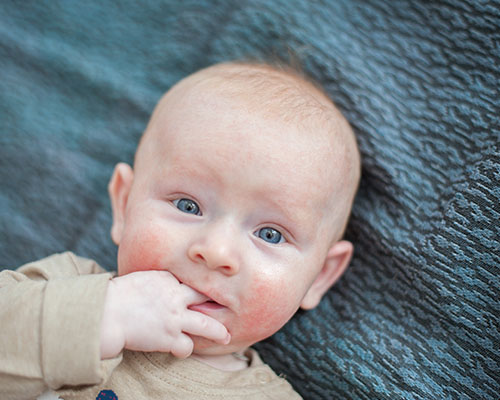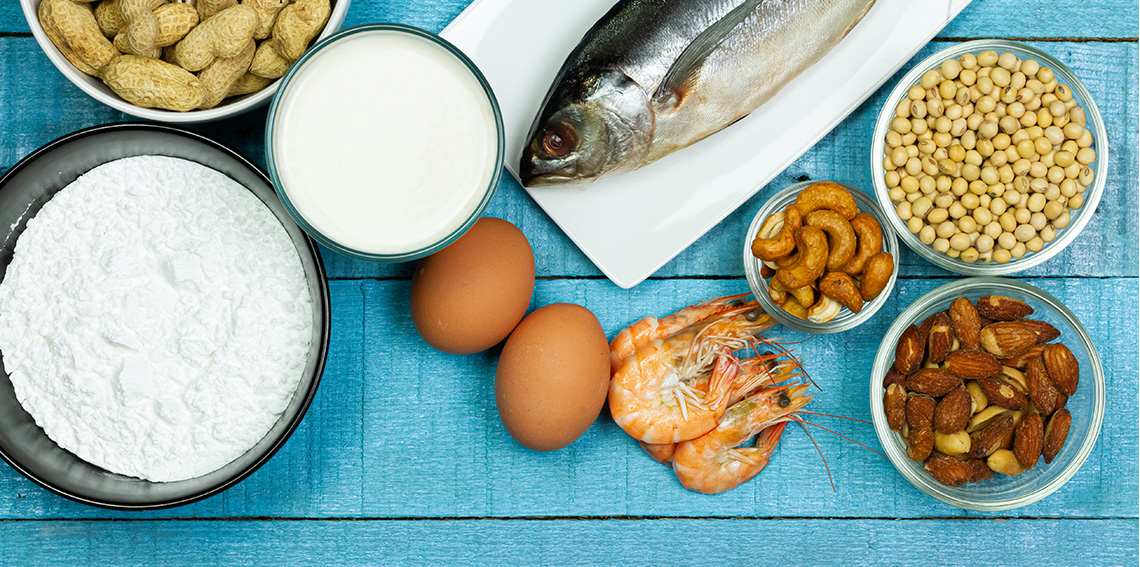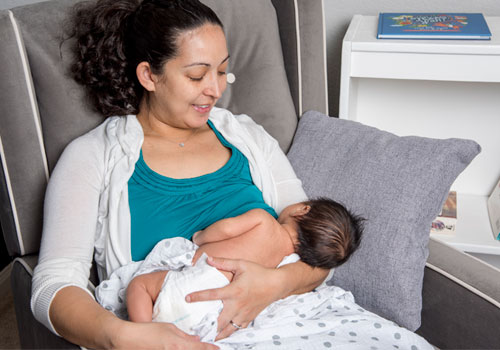KNOW THE SIGNS AND WHAT TO DO
A food allergy happens when the immune system has a negative reaction to the proteins in a certain food. Many allergies often start in childhood. As you start introducing solids to your baby, it is important to know the signs of an allergy.
If your baby has a food allergy, you will usually notice the signs between 2 minutes to 2 hours after he eats. Some signs are mild, such as itching or skin irritation. Other reactions are very serious (and dangerous) such as trouble breathing or fainting. While food allergies can be scary for parents, many children eventually outgrow them.

Is it an allergy?
Reactions to food aren’t always an allergy, though. Food poisoning or diseases like celiac disease can cause vomiting, diarrhea and stomach pain. Tummy troubles can also be caused by a food intolerance, like lactose intolerance, which is different than an allergy. Food intolerance symptoms are usually less serious and include an upset stomach, diarrhea and gas. Even if it isn’t an allergy, it’s important to talk to your health care provider or WIC nutritionist if your baby often has an upset stomach.
Watch for this. Common signs of a food allergy:
- Hives
- Flushed (red), warm skin or rash
- Tingling or itchy sensation in the mouth, hands, face, neck and other parts of the body that may cause your baby to feel uncomfortable and begin scratching
- Face, tongue or lip swelling
- Vomiting or diarrhea
- Stomach cramps
- Coughing or wheezing
- Dizziness
- Difficulty breathing as a result of swelling of the throat and vocal cords
- Loss of consciousness
If your baby has several of these signs or is having trouble breathing, it could be a life-threatening reaction called anaphylaxis. Call 911 immediately!

What are the most common foods that cause allergies?
- Dairy such as milk, cheese, cream, yogurt, butter, sour cream, ice cream, etc.
- Eggs
- Wheat
- Soy
- Peanuts
- Tree nuts, such as almonds, pecans, walnuts, pistachios, etc.
- Fish: specifically, finned fish such as tuna, salmon, cod, etc.
- Shellfish such as shrimp, lobster, clams, oysters, etc.
- Sesame seeds
Although these are the most common foods that cause allergies, any food can cause an allergic reaction.

How can I reduce the risk of an allergic reaction?
- Feed your baby only breastmilk for the first 6 months of life. Your baby won’t need solid foods until he is around 6 months of age.
- Introduce new foods one at a time. Wait 3 to 5 days before offering another new food so you can be sure your baby doesn’t have an allergy.
- Introduce new foods while you are at home and early in the day so that you can watch your baby closely for signs of reaction. Some babies react after the second or third time an allergenic food is introduced, so be cautious until after the third try.
- Start slow — give small tastes and not full servings until you are sure there is no sign of an allergy.
- To learn more about introducing solid foods to your baby, take our online lesson “Baby’s First Bites.”
Unless your health care provider tells you differently, you do not need to avoid the common food allergens while you are pregnant or breastfeeding. Introducing a common food allergen to your baby after 6 months is okay and in the case of peanut allergies, giving him foods containing ground or powdered peanuts may even lower his risk of developing an allergy. It does not increase the chance of your baby developing a food allergy.
You may be concerned about introducing foods to your baby that could be choking hazards, like peanuts. If you want to learn more about choking hazards, visit the CDC website.

Help: I think my child might have a food allergy.
Expert Advice: If you are exclusively breastfeeding and you suspect that your baby may have food allergies:
- You don’t need to stop breastfeeding your baby.
- Talk to your health care provider and a WIC lactation consultant about your baby’s symptoms.
- You may be advised to reduce or eliminate certain foods from your diet. If so, contact your local WIC registered dietitian to help you modify your diet.
Expert Advice: If your child is showing signs of a possible food allergy:
- Talk to your health care provider to see if allergy testing is needed.
- Get ready to start reading food labels. Learn the different ways that allergens can be labeled, and make sure you read the entire food label.
- Talk to a WIC nutritionist for help.
- Ask your health care provider if your child needs a vitamin or mineral supplement.
- Many children outgrow food allergies.



 Have any questions?
Have any questions?
